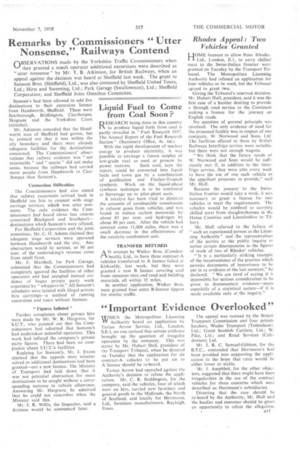Rhodes Appeal : Two Vehicles Granted
Page 49

If you've noticed an error in this article please click here to report it so we can fix it.
HOME licences to allow Peter Rhodes. I 1 Ltd., London, El, to carry chilled meat to the Swiss-Italian frontier were granted on Tuesday by the Transport Tribunal. The Metropolitan Licensing Authority had refused an application for four vehicles to be used, but the Tribunal agreed to grant two.
Giving the Tribunal's reserved decision. Mr. Hubert Hull, president, said it was the first case of a haulier desiring to provide a through road service to the Continent seeking a licence for the journey on English roads.
No question of general principle was involved. The only evidence of need for the proposed facility was in respect of one company, W. Norwood and Sons, Ltd. The facilities offered to them by British Railways Interfrigo service were suitable. but there were not enough wagons.
"We think that the future needs of W. Norwood and Sons would be sufficiently met if, in addition to the Interfrig° service, they were able every week to have the use of one such vehicle as the appellant proposes to provide," said Mr. Hull.
Because the journey to the SwissItalian frontier would take a week, it was necessary to grant a licence for two vehicles to meet the requirements. The vehicles would be confined to carrying chilled meat from slaughterhouses in the Home Counties and Lincolnshire to Tilbury.
Mr. Hull referred to the failure of "such an experienced person as the Licensing Authority" and the representatives of the parties at the public inquiry to notice certain discrepancies in the figures of work of two of Rhodes' vehicles.
"It is a particularly striking example of the inconvenience of the practice which permits documents of importance to be put in as evidence at the last moment," he declared. "We are tired of saying it is impossible for serious consideration to be given to documentary evidence—more especially of a statistical nature—if it is made available only at the inquiry."












































































































































